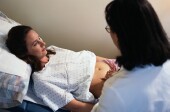Cancer-Suppressing Gene Tied to Female Fertility
It's potentially another helpful role for p53, scientists say.
By Steven Reinberg
HealthDay Reporter
|
E-mail this article
Subscribe to news
Printer friendly version
|

(SOURCES: Arnold J. Levine, Ph.D., professor, Institute for Advanced Study, Princeton, N.J.; Colin Stewart, Ph.D., principal investigator, Institute of Medical Biology, Singapore; Nov. 29, 2007, Nature)
WEDNESDAY, Nov. 28 (HealthDay News) - A gene long linked to suppressing the growth of cancer may also play a vital role in human reproduction, researchers report.
In experiments with mice, researchers found that females lacking the p53 gene had fewer embryos implanted in the uterus, less chance of becoming pregnant, and when they did conceive, they had fewer offspring. A lack of p53 did not affect the fertility of male mice, however.
"This is an amazing new function for a gene that everybody thought they knew what it did," said lead researcher Arnold J. Levine, a professor at the Institute for Advanced Study, in Princeton, N.J. "This is a gene that is not only watching over us so that we cannot get cancer, but it watches over our genome so that we can develop normally," he added.
The report appears in the Nov. 29 issue of Nature.
The p53 gene responds to a variety of stresses, such as radiation damage, in ways that allow it to protect cells against cancer, Levine explained. However, he added, "We found, quite by surprise, the normal function of p53 in the uterus of mice."
In order for embryos to implant in the uterus, a cytokine called LIF (leukemia inhibitory factor) is essential, and "p53 turns on the gene that makes LIF," Levine explained. "It's estrogen plus p53 making LIF that allows implantation."
In mice without the p53 gene, males are fine, but females only infrequently implant eggs and "the litter sizes go way down," Levine said. However, when these mice were given an injection of LIF, they reproduced normally.
Whether this finding has implications for humans isn't clear, Levine said. "We do know that humans require LIF in the uterus, but whether p53 has the same function in humans is something we are working on," he said.
Levine believes that p53 could play a part in human reproduction and infertility, but "there must be other factors as well," he said.
Defects in p53 are extremely rare in humans. "There are about 250 families in the United States that have defects in the p53 gene, a condition called Li-Fraumeni syndrome. This syndrome predisposes patients to cancer at an early age," Levine said.
One expert believes the finding could have clinical implications.
"Some humans show genetic variation in the amount of p53 they can produce and how well some of these variants of p53 function," said Colin Stewart, a principal investigator at the Institute of Medical Biology in Singapore and author of an accompanying editorial in the journal.
One study suggested that some women who have difficulty in getting pregnant tend to have the less efficient form of p53, Stewart noted.
"This may be why they have problems becoming pregnant, because the less efficient form of p53 does not make sufficient amounts of LIF that are necessary to get the embryo to attach to the wall of the uterus," Stewart said.
Drugs are currently being developed that would either improve the way p53 works or block the action of defective forms of p53, Stewart said.
"Some of these drugs may turn out to be useful in helping women conceive by improving the function of p53 in the uterus. Others may turn out to be possible contraceptives by blocking p53's function in the uterus," he added.
More information
For more information on p53, visit the National Center for Biotechnology Information.
Copyright © 2007 ScoutNews, LLC. All rights reserved. 
HealthDayNews articles are derived from various sources and do not reflect federal policy. healthfinder.gov does not endorse opinions, products, or services that may appear in news stories. For more information on health topics in the news, visit the healthfinder.gov health library.